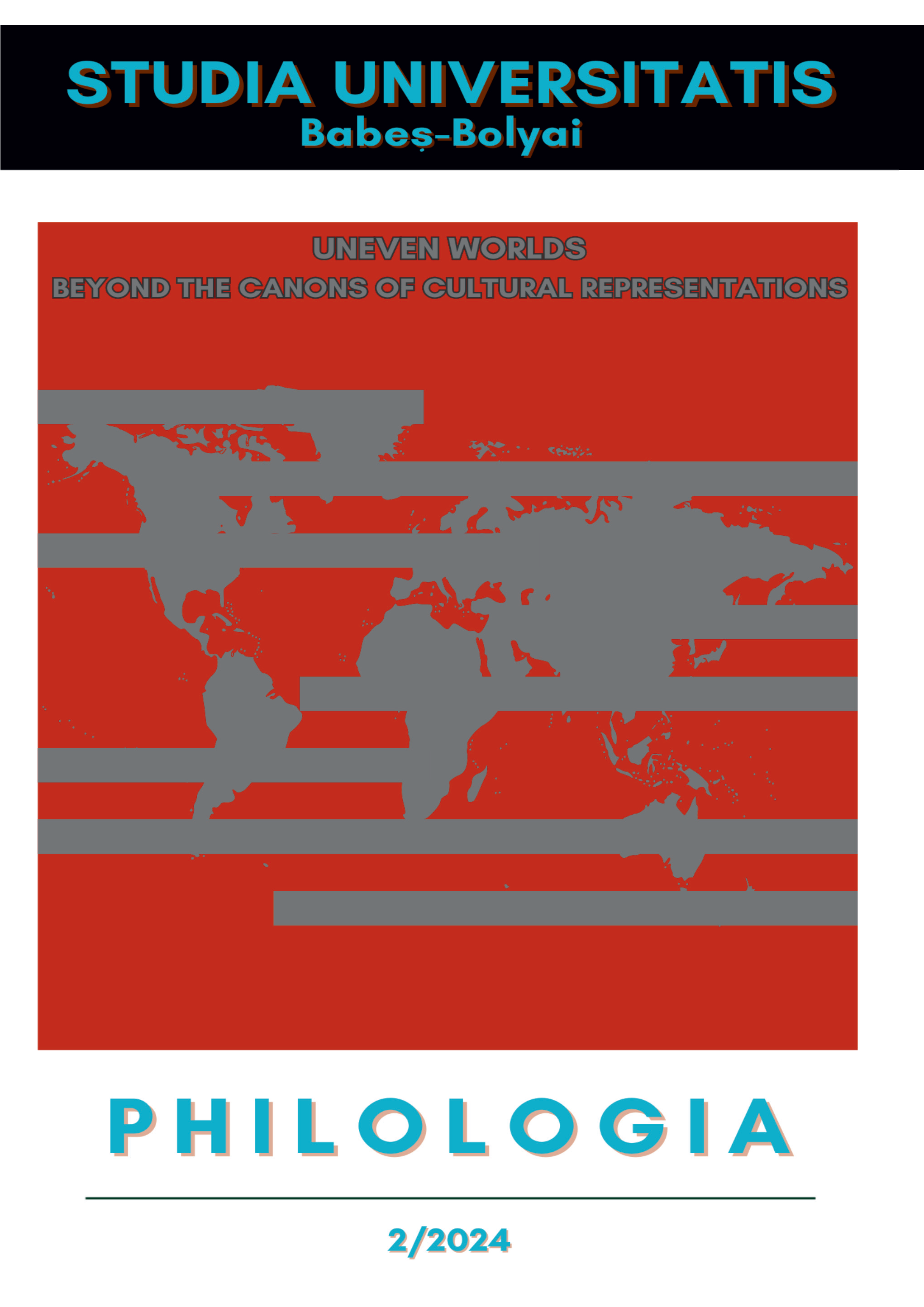ROMANIAN AND HUNGARIAN OTHERNESS. A WORLD-SYSTEM PERSPECTIVE ON THE EVENT NOVEL
DOI:
https://doi.org/10.24193/subbphilo.2024.2.10Keywords:
world-system theories, frontier Orientalism, imaginary, subgenre, Romanian literature, Hungarian literatureAbstract
Romanian and Hungarian Otherness. A World-System Perspective on the Event Novel. The article aims to investigate how the combined and unequal world-system is reflected in two peripheral novels in the modern literary system that focus on the Romanian-Hungarian 1919 military conflict, as part of the First World War. The Death of a Red Republic [Moartea unei Republici Roșii] by Felix Aderca and Anna Édes by Dezső Kosztolányi are comparatively discussed in order to see how regional and (semi-)peripheral literatures articulate the dynamics of world-systems and geographies of uneven development. The event novel, both recipient and generator of tensions and socio-economic, political, and cultural change, is representative of the articulation of imaginary patterns regarding otherness. In this sense, the article investigates how “frontier Orientalism” is activated in the narrative of the war and how this imaginary reflects the inequalities within the world system.
Alteritatea română și maghiară. O perspectivă sistem-lume asupra romanului evenimentului. Articolul își propune să investigheze modul în care sistemul-lume combinat și inegal este reflectat în două romane periferice în sistemul literar modern, romane care au în centru conflictul româno-maghiar din 1919, parte a primului Război Mondial. Moartea unei Republici Roșii de Felix Aderca și Anna Édes de Dezső Kosztolányi sunt discutate comparativ pentru a vedea cum literaturile (semi)periferice articulează dinamica sistemelor-lume și a geografiilor dezvoltării inegale. Romanul evenimentului, ca narațiune care încapsulează și generează tensiuni și schimbări socio-economice, politice și culturale este reprezentativ pentru articularea tiparelor imaginare privind alteritatea. În acest sens, articolul investighează modul în care “orientalismul de frontieră” este activat în narațiunea despre război și modul în care acest imaginar reflectă inegalitățile din cadrul sistemului-lume.
Cuvinte-cheie: teoria sistemului-lume, orientalism de frontieră, imaginar, subgen, literatură română, literatură maghiară
Article history: Received 06 February 2024; Revised 19 May 2024; Accepted 24 May 2024; Available online 25 June 2024; Available print 30 June 2024.
References
Aderca, Felix. 1924. Moartea unei Republici Roșii. București: Editura Ancora.
Anderson, Benedict. 2006. Imagined Communities. Reflections on the Origin and Spread of Nationalism. London: Verso.
Crețu, Bogdan. 2019. “Literatura de război, de la textul ideologic la literatura memoriei. Pornind de la Sadoveanu.” In Primul Război Mondial în Europa: realitatea literaturii, literatura realității/First World War in Europe: the Reality of Literature, the Literature of Reality, coord. by Raluca Dună, 102-110. București: Editura Muzeul Literaturii Române.
Erll, Astrid. 2009. “Wars We Have Seen: Literature as a Medium of Collective Memory in the Age of Extremes.” In Memories and Representations of War: The Case of World War I and World War II, edited by Elena Lamberti and Vita Fortunati, 27-43. Amsterdam-New York: Rodopi B.V.
Fuchs, Anne. 2012. After the Dresden Bombing. Pathways of Memory, 1945 to the Present. Palgrave MacMillan.
Gingrich, Andre. 1996. “Frontier Myths of Orientalism: The Muslim World in Public and Popular Cultures of Central Europe.” In Mediterranean Ethnological Summer School, ed. by Bojan Baskar – Borut Brumen, 99–127. Piran: Institut za multikulturne raziskave.
Hynes, Samuel. 1990. A War Imagined: The First World War and English Culture. London: The Bodley Head.
Jameson, Fredric. 1981. The Political Unconscious. Narrative as a Socially Symbolic Act. New York: Cornell University Press.
Kosztolányi, Dezső. 1993. Anna Édes. Translated and with an introduction by George Szirtes, New York: A new directions books.
Löschnigg, Martin. 2020. “Narrating Modern War: Technology and the Aesthetics of War Literature.” Primerjalna književnost , 43.1: 143-155.
Mitu, Melinda, Sorin Mitu. 2014. Unguri despre români. Nașterea unei imagini etnice. Iași: Polirom
Moretti, Franco. 2000. “Conjunctures on World Literature.” New Left Review I: 54-68.
Norris, Margot. 2000. Writing War in the Twentieth Century. Charlottesville: University Press of Virginia.
Pál, Judit, Nándor Bárdi. 2022. “Maghiarii și românii din Transilvania în Primul Război Mondial, între stereotipii etnice, conflict mocnit și nevoia de conviețuire: Studiu introductiv.” In Dincolo de tranșee. Cum au trait maghiarii din Transilvania Marele Război și Trianonul. Texte din jurnale și memorii alese și adnotate de Nándor Bárdi și Judit Pál edited by Nándor Bárdi and Judit Pál, Traducere de S. Skultéty, 13-29. București: Humanitas.
Said, Edward W. 1979. Orientalism. New York: Vintage Books.
Terian, Andrei, Daiana Gârdan, Emanuel Modoc, Cosmin Borza, Dragoș Varga, Ovio Olaru, David Morariu. 2020. “Genurile romanului românesc (1901-1932). O analiză cantitativă.” Revista Transilvania 10: 53-64.
Warwick Research Collective. 2015. Combined and Uneven Development. Towards a New Theory of World-Literature. Liverpool University Press.
Downloads
Published
How to Cite
Issue
Section
License
Copyright (c) 2024 Studia Universitatis Babeș-Bolyai Philologia

This work is licensed under a Creative Commons Attribution-NonCommercial-NoDerivatives 4.0 International License.



